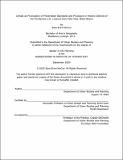| dc.contributor.advisor | Brent Ryan. | en_US |
| dc.contributor.author | McCoy, Sara Brent. | en_US |
| dc.contributor.other | Massachusetts Institute of Technology. Department of Urban Studies and Planning. | en_US |
| dc.coverage.spatial | n-us-fl | en_US |
| dc.date.accessioned | 2021-01-05T23:10:32Z | |
| dc.date.available | 2021-01-05T23:10:32Z | |
| dc.date.copyright | 2020 | en_US |
| dc.date.issued | 2020 | en_US |
| dc.identifier.uri | https://hdl.handle.net/1721.1/128970 | |
| dc.description | Thesis: M.C.P., Massachusetts Institute of Technology, Department of Urban Studies and Planning, September, 2020 | en_US |
| dc.description | Cataloged from student-submitted PDF of thesis. | en_US |
| dc.description | Includes bibliographical references (pages 44-51). | en_US |
| dc.description.abstract | With many historic resources located in coastal, flood-prone environments, much has been written in the last two decades about the (re)negotiation of local preservation regulatory standards to facilitate adoption and uptake of on-site flood-mitigating measures for low-lying historic buildings and structures. Though various design guidelines have been developed to facilitate the simultaneous pursuit of climate adaptation and historic preservation, various tensions between the two remain. This thesis uses as an illustrative case a series of events and conditions in Miami Beach, FL, where residents of a low-lying historic district are seeking to have their district's historic status revoked, in light of perceived limitations posed by the implications of the designation on their capacity to adapt their homes in response to increasing flood risk. Analyses of interviews with stakeholders in Miami Beach and preservation ordinances across Florida are contextualized by literatures around preservation law, critical conservation, and adaptation decision-making. This thesis suggests that efficient, effective adaptation of historic resources in places like Miami Beach will require a (re)negotiation of not just preservation standards (of appropriateness, integrity, what merits designation) but also procedure, wherein preservation decision-making processes become less expert-driven and more actively account for a greater diversity of community values. | en_US |
| dc.description.statementofresponsibility | by Sara Brent McCoy. | en_US |
| dc.format.extent | 51 pages | en_US |
| dc.language.iso | eng | en_US |
| dc.publisher | Massachusetts Institute of Technology | en_US |
| dc.rights | MIT theses may be protected by copyright. Please reuse MIT thesis content according to the MIT Libraries Permissions Policy, which is available through the URL provided. | en_US |
| dc.rights.uri | http://dspace.mit.edu/handle/1721.1/7582 | en_US |
| dc.subject | Urban Studies and Planning. | en_US |
| dc.title | Climate as provocation of preservation standards and procedure in historic districts of the floodprone U.S. : lessons from Palm View, Miami Beach | en_US |
| dc.type | Thesis | en_US |
| dc.description.degree | M.C.P. | en_US |
| dc.contributor.department | Massachusetts Institute of Technology. Department of Urban Studies and Planning | en_US |
| dc.identifier.oclc | 1227048985 | en_US |
| dc.description.collection | M.C.P. Massachusetts Institute of Technology, Department of Urban Studies and Planning | en_US |
| dspace.imported | 2021-01-05T23:10:31Z | en_US |
| mit.thesis.degree | Master | en_US |
| mit.thesis.department | UrbStud | en_US |
